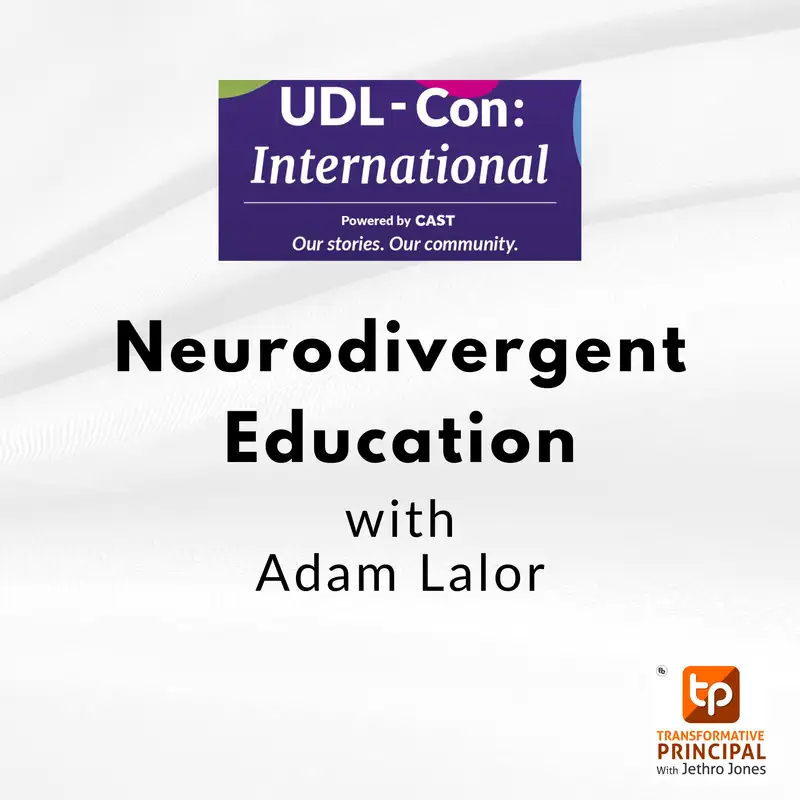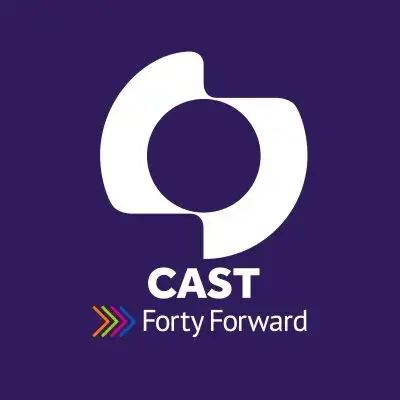Neurodivergent Education with Adam Lalor #udlcon
Download MP3Adam Lalor
===
[00:00:00] Welcome to Transformative Principle. I am here live for this episode at the CAST UDL Con International Conference, and here we are talking about all things related to Universal Design for learning, which is a way to make it so that learning is accessible to all students. This has been a great conference
so far, the one you're listening to right now is from the UDL Conference. And really a great time. Check it out, Check out cast.org for information about UDL. UDL-Con and so much more.
Okay, welcome to the special episode of Transformative Principal here at UDL Conn, uh, powered by cast. Uh, grateful to have Adam [00:01:00] Laer here with us. He is the Vice President at Lake, uh, landmark College. Sorry about that. Not all the ls. All right. Uh, Adam, so tell us a little about, a little bit about Landmark College and what makes it unique.
Yeah. Landmark College, uh, is a really young college. Uh, we are the first college in the entire world, solely for students who identify as neurodivergent.
So in particular, students with learning disabilities, A DHD, autism, dyslexia, executive function challenges. And what we do is we are really a community. We're community much in the same way that HBCUs or women's colleges. We are to neurodivergent students, what they are to their population. So we provide a unique education that is, that embeds universal design for learning across not only the curriculum, but across student life.
life
And we also build in [00:02:00] opportunities for students to explore their culture, the culture of neurodiversity, understand their identity, learn advocacy skills. We try to embed in them opportunities for them to feel pride and belonging to their community. Uh, what we do is we help students understand their learning profiles.
We celebrate their history. History that frankly had oftentimes been left out of their K 12 curriculum. I mean, oftentimes they know about Helen Keller and they know that FDR was a wheelchair user. That's usually where it ends. Uh, and what we try to do is empower them with knowing more about their history of the people and celebrating their strengths, not just focusing on their limitations.
Yeah.
One of the things that's new about the 3.0 guidelines is more of an emphasis on identity and bringing that about, and I think that that is [00:03:00] really important. But I fear that by focusing too much on identity, we silo and, uh, contain ourselves within something that is not expansive enough to describe us.
You know? So if, if you are just focused on race or gender, or. Um,
neurodiversity
whatever other single thing, then it limits you to who you really are and how, how do you manage and deal with that.
You know, that's a really interesting question 'cause that's something that we get asked a lot. Shouldn't we all be included? Shouldn't we all be part of the same community And we absolutely should. Um, unfortunately, to be included means to go beyond just someone saying, okay, you're included. It has to be from the bottom up.
You have to really ingrain people and who they are as people and all their multiple facets into the institution. And as I [00:04:00] was saying, disability is not really explored. Um, as a culture within higher education, nor within K 12 education, we're beginning to change that, but to focus solely on neurodivergence or focus solely on disability, in my opinion, would not be the way to go.
Mm-Hmm. You really have to, I mean, those are not monolithic groups, so it really has to be done, uh, in a way that, that interweaves, uh, all the different identities that a student shares and a recognition that at our core. We're all different. I mean, no one has the same exact identities most likely. If you go throughout that, and certainly we don't have the same brains.
That's the idea of neurodiversity that we all are in. I mean, the brain is more unique than any snowflake, uh, than any, uh, fingerprint. It's really what distinguishes us from one another, and to celebrate that as a facet of our diversity is key, [00:05:00] but it can't go. It can't be viewed as a single facet. The only thing that's focused on, we really do a lot at Landmark College to integrate identities and race, ethnicity, gender, sexual orientation, religion, all into this idea of, uh, disability and neurodiversity so that we can explore the richness of the community.
One of the things that our students say a lot is that when they come to Landmark. Okay, well we do talk a lot about neurodiversity and disability. It really is one of those things where that doesn't become the salient characteristic anymore because they're one of many on a college campus. So we have, um, students of color, a group of black and African American students in our reach.
One teach one program that I work with pretty regularly, and one of the things that they'll say is, you know, I was the special ed kid in K 12. That was my identity. That was the most salient thing. 'cause that's what people saw me [00:06:00] as here. I can let that go. And you know what? I can focus on my other identity, the other aspects of me that in some ways might be more germane to my lived experience.
Uh, so it's a really, a fascinating way to have a cultural community in some ways allows you to explore much more broadly. Yeah.
So you uh, college is an exclusive thing and there's so many barriers put up to prevent people from getting in and many. Prestigious colleges, uh, highlight the fact that they are exclusive, not inclusive. And I think there's a place for a school like Landmark to be small, to be new, to be focused on a specific group of people that makes a difference.
Um, what, what other advice do you have for other universities to be more inclusive in ways that that matter and mean [00:07:00] something?
Yeah. That's a great, that's a wonderful question, and it's one of those things where, and for lack of a better word, there's no one silver bullet.
It has to be a, a, a conservative effort. We're a unique institution. I mean, being an entirely neurodivergent community, unless another institution changes their mission, but it's, we're gonna always be somewhat different. That said, there are things that I think other educators and other institutions of higher education can certainly take from our experience and then adapt it, bring it into their culture, bring it into their institution.
So some of the things that I think they could really do is, one, get educated. Mm-Hmm. I mean, the idea of disability, I mean, we are still, and I'm a member of this community, we're still marginalized. Um, sometimes I say we live between the commas. There's a, a list of diversity characteristics in your [00:08:00] diversity mission, race, ethnicity, gender, disability is always there, but that, with the exception of disability resource work and a DA coordinators that focus on compliance, we really don't get, we're always caught between those commas.
We don't ever get into other areas of the college. Um, so really valuing diversity as a fabric. Uh, as a part of the fabric of diversity is critical. Um, and with that, there are opportunities to educate your faculty, your staff, your administrators, about not just the diagnostic characteristics, uh, but really what are the lived experiences of these students, of your colleagues who are disabled and neurodivergent.
We can, we can do a lot. I mean, I mean, there's basic education that can be done, but what's really powerful is. First and foremost, the development of empathy and not sympathy. I wanna make that clear. It's mean. I'm not, I'm not looking for pity, I'm not looking [00:09:00] for charity. What we're looking for is people to sort of have an understanding of what's it like going into a classroom and you can't read, and everything presented to you is in writing or being a blind student going into a classroom and everything's written down and you can't see it.
Hmm, that that's a barrier to us. It doesn't mean that we're less capable of education, less able to learn, less intelligent. We just need to provide it in a different way. And that's that idea of universal design for learning, trying to meet people proactively where they are. So certainly universal Design for learning is something else.
How do we make things accessible proactively? Yeah. Yeah.
So why do you come here to U Dcon? What brought you here?
UD Elcon is, uh, and this is the first UDL con Mm-Hmm. Um, so for me, I mean, being a big believer in universal design for learning, it had to be here. [00:10:00] Um, I, I'm a representative of our institution, uh, landmark College, and we embed universal design.
It's pretty much baked into the cake in many ways. Um, but. We know that we have divergent learners, even amongst the neurodivergent community, and we really want to make sure that we reach as many of them as possible. And universal design for learning in this event is to be frank, long overdue. Um, but it's exciting that it's here and that has really been a shift in the culture of higher education.
More people are aware of it. I mean, one of the silver linings of the pandemic was the, uh, increased visibility of, in particular neurodivergent students who needed to learn in ways that were differently, especially in online. So, U uh, UDL Conn really celebrates that universal design has arrived. It's has [00:11:00] awareness amongst the general population.
It's not just a disability special education thing anymore. Yeah, it really is an a good. Educational framework for student learning. Yeah.
Well, and I appreciate that you're here also, because I bet that of all the people listening to my show. 99% of 'em have never heard of Landmark College and your explicit focus on neurodivergent students. And I just think that's, that's really great because many of the administrators, counselors, teachers who are helping these students apply to colleges don't know that there's an option specifically designed for them where they all know that regular colleges are not designed for them.
And this is a, a real. Opportunity. So I, I appreciate that. If people wanna know more, how, where do they go? What, how do they learn more?
Certainly, uh, I mean, they can go to our website, uh, landmark.edu. [00:12:00] And they can find out about all our different programs, um, our baccalaureate or programs, our associate programs on campus, our a associates program, uh, that's online.
We offer dual enrollment to high school students who are looking for that intermediary step. Um, we know all know that transition is hard, particularly for, uh, our disabled students. So this will put an additional, uh, step in that transition process. Frankly, we also have offer professional development for educators who are looking for additional credentials, uh, related to learning differences in neurodiversity.
So check us out@landmark.edu.
Creators and Guests



